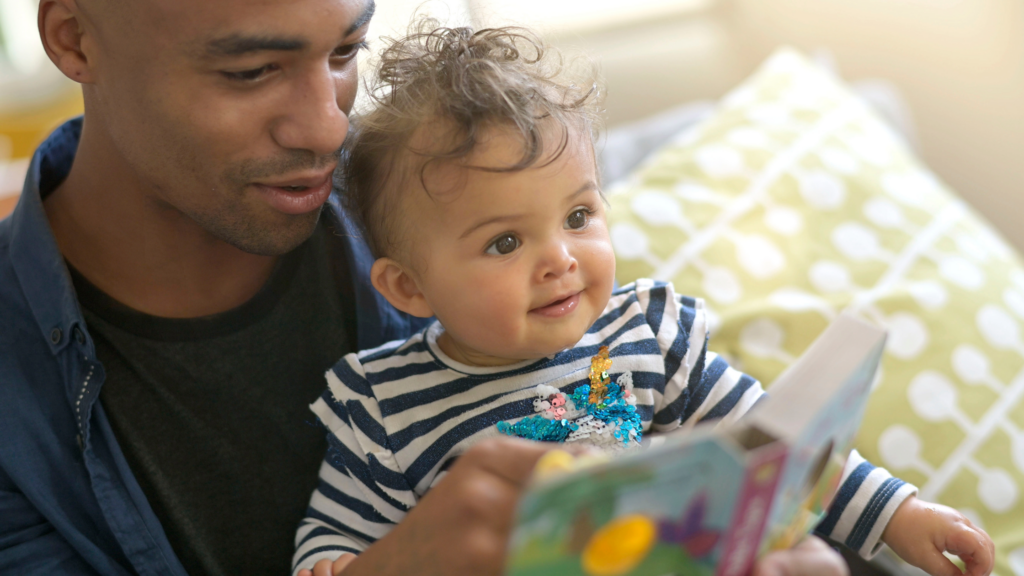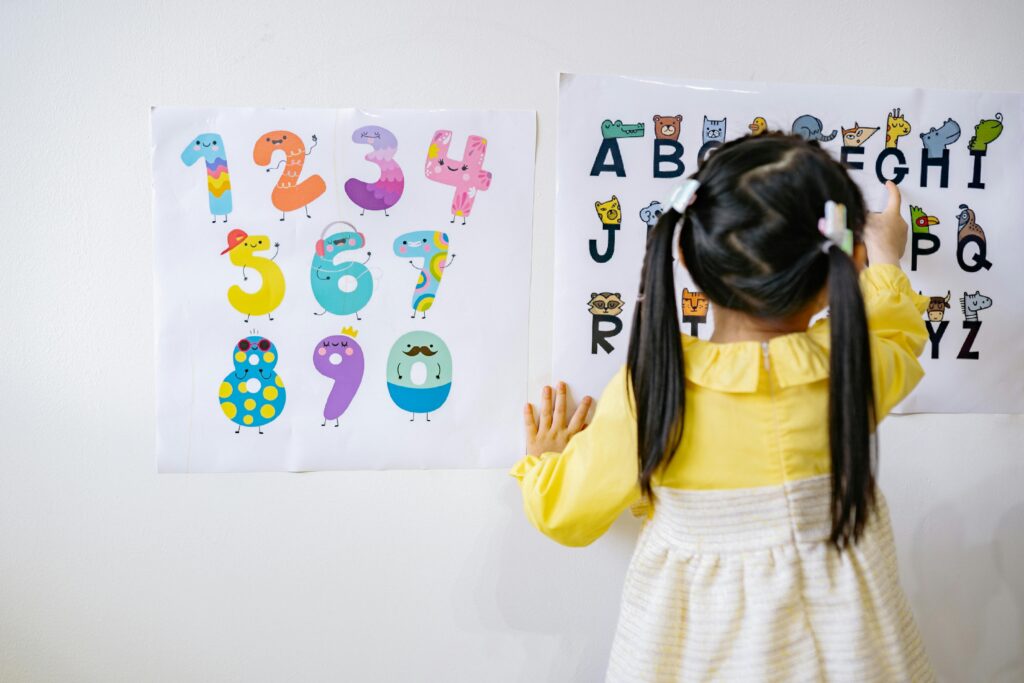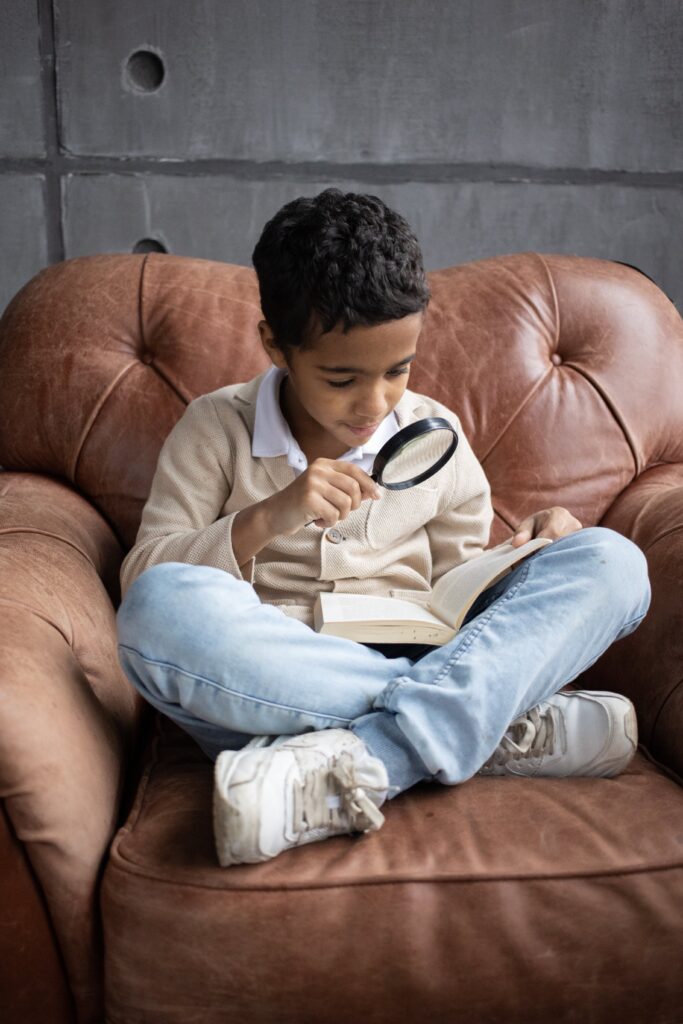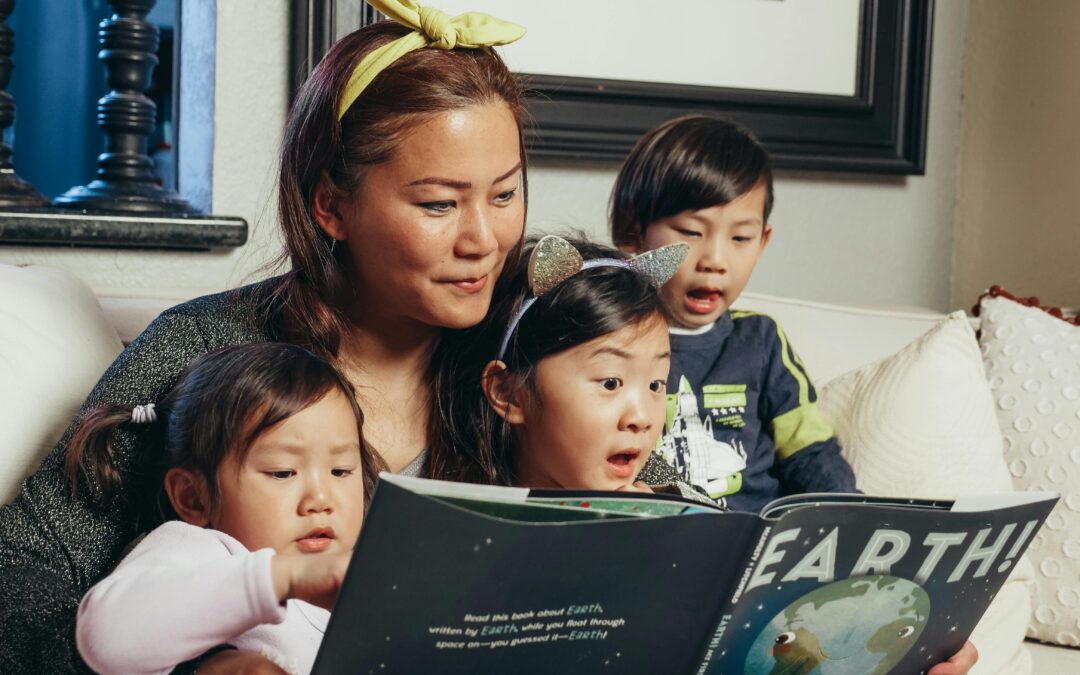From working in preschool for years, working with foster children, and as a mother I have experienced reading from a parent and teacher’s point of view. With all that, I know firsthand how overwhelming it can be to track your child’s reading development. After years of working with young readers (and raising my own little bookworms!), I’ve learned that understanding reading milestones by age isn’t just about checking boxes – it’s about creating a love for reading that lasts a lifetime.
Listen to this: research shows that children who are read to for just 15 minutes a day are exposed to 1 million words per year! Pretty amazing, right? Let’s dive into what you can expect at each stage of your child’s reading journey, complete with my favorite book recommendations that have been kid-tested and parent-approved.
A love of reading can start from the moment your baby puts that first book into his mouth, showing his good taste!
Early Literacy Foundations:
The Magic of Birth to Age 2

You might be thinking, “Reading? They can barely hold their head up!” But trust me, literacy development starts from day one. During this stage, your little one is soaking up language like a sponge and building crucial pre-reading skills.
What to Look For:
- Responds to voices and shows interest in sounds
- Enjoys being read to (even if just for a few minutes!)
- Starts pointing to pictures in books
- Attempts to turn pages (even if they grab several at once)
- Begins babbling while looking at books
Daily Literacy Activities:
- Sing nursery rhymes during diaper changes (trust me, it makes everything easier!)
- Play peek-a-boo with books – this teaches object permanence
- Name everything you see during daily routines
- Do finger plays like “Pat-a-Cake” and “Itsy Bitsy Spider“
- Make silly sounds during tummy time
Quick Literacy Games:
- “Where’s the…?” – Point to pictures in books
- “What sound does ____ make?” – Make animal noises during book reading
- “Touch and Feel” – Use textured books during reading time
- “Label Tours” – Walk around naming objects in different rooms
My Top Book Picks for This Age:
- “Brown Bear, Brown Bear, What Do You See?” by Bill Martin Jr. and Eric Carle.
- “Baby Animals” by Roger Priddy (or other sensory books that are interactive)
Emergent Reader Stage: The Exciting Ages 2-4

This is when the magic really starts happening! Your toddler is beginning to understand that those mysterious marks on the page actually mean something. It’s absolutely adorable watching them “read” their favorite books from memory!
Key Milestones:
- Recognizes familiar logos and signs (hello, Target run!)
- Holds books right-side up
- Pretends to read to dolls or stuffed animals
- Knows some letter names and sounds
- Can retell favorite stories
Daily Activities:
- Create a letter of the week focus
- Play “I Spy” with letter sounds
- Draw letters in shaving cream or sand
- Make grocery lists together (their scribbles count!)
- Label their artwork with their narration
Engaging Games:
- “Letter Body Shapes” – Make letters with your body
- “Rhyming Basket” – Collect items that rhyme
- “Story Stone” – Paint pictures on stones for storytelling
- “Environmental Print Hunt” – Find familiar logos and signs
- “Letter Dance Party” – Dance when you hear certain sounds
Must-Have Books for This Stage:
- “Little Blue Truck” by Alice Schertle and Jill McElmurry
- “Pete the Cat” series – The repetitive phrases boost confidence
I loved watching my daughter set up her stuffed animals and read them a story at this age. They would all be such good listeners!
Beginning Reader Phase: The Foundation Years (Ages 4-6)

This is when most kids start cracking the reading code, and let me tell you – there’s nothing quite like watching a child read their first word independently!
What You’ll Notice:
- Understands that words read left to right
- Recognizes and names most letters
- Starts sounding out simple words
- Shows interest in environmental print
- May recognize some sight words
Daily Activities:
- Create word family charts
- Practice sight words with magnetic letters
- Write simple stories together
- Make sound sorting boxes
- Create a daily message board
Fun Learning Games:
- “Word Detective” – Hunt for sight words in favorite books
- “Rhyming Memory” – Match rhyming pairs
- “Story Sequencing” – Put picture cards in order
- “Sound Swat” – Use a fly swatter to hit letter sounds
- “Reading Recipe” – Follow simple picture recipes together
Books That Build Confidence:
- “Dick and Jane” series – I know these have fallen out of popularity, but I have used them for both my children and they build the confidence in a beginning reader through constant repetition of words and a funny ending to most stories.
- “I Hop” series by Joe Cepeda – Very simple words to build confidence.
As I encouraged my son to read to me one Dick and Jane story a night before his bedtime snack, he was able to boost his reading skills in a matter of days. Repetition, plus a reward (snack!) got him going. After that he was ready to read harder books!
Developing Reader Stage: Taking Off! (Ages 6-8)

Hold onto your hats, because this is when reading really takes off! Your child is transforming from learning to read to reading to learn.
Exciting Developments:
- Reads simple books independently
- Uses multiple strategies to decode words
- Shows improved fluency
- Understands basic punctuation
- Self-corrects when reading doesn’t make sense
Daily Activities:
- Start a reading journal
- Create story maps
- Practice timed readings (make it a game!)
- Write and illustrate mini-books
- Read different genres each day
Engaging Literacy Games:
- “Reader’s Theater” – Act out favorite stories
- “Genre Scavenger Hunt” – Find examples of different types of texts
- “Story Elements Charades” – Act out characters, settings, or events
- “Fluency Phone” – Practice reading with PVC pipe phones
- “Comprehension Cube” – Roll a cube with questions to answer about the story
Reading Level Sweet Spots:
- “Frog and Toad” series by Arnold Lobel – A timeless favorite that builds reading stamina
- “Mercy Watson” series by Kate DiCamillo – Perfect for those ready for chapter books
I remember sitting by my daughter’s side as she read her first Frog and Toad story all by herself. She was so proud of her skills, and on her way to reading whole books alone!
Advanced Reading Skills: The Independent Years (Ages 8-12)

By this stage, your young reader is probably introducing YOU to new books! It’s amazing to watch them develop their own reading preferences and tackle increasingly complex texts.
Key Achievements:
- Reads fluently with expression
- Understands various genres
- Makes connections between texts
- Uses reading strategies independently
- Develops critical thinking skills
Daily Activities:
- Start a book club with friends
- Create book trailers
- Write book reviews
- Compare books to movies
- Keep a vocabulary journal
Creative Literacy Games:
- “Author’s Chair” – Share original stories
- “Literary Debates” – Discuss different perspectives
- “Character Interview” – Role-play as book characters
- “Story Transformation” – Change genres or endings
- “Book Recommendation Challenge” – Match books to readers
Books They’ll Love:
- “Mrs. Piggle-Wiggle” by Betty MacDonald – Fun for all readers
- “The Secret of the Hidden Scrolls” series by M. J. Thomas – Great for adventure lovers and learning Bible stories.
Kids this age will find their own style of books. This might be a time of exploring a lot of different types of books. Graphic novels and very popular now, and this age is a good time to try those as well.
Supporting Your Child’s Reading Journey: My Top Tips
After years of working with young readers, here’s what I’ve found really works:
- Make it fun! Reading should never feel like a chore
- Follow their interests – even if that means reading comic books
- Create a cozy reading nook (My daughter took ownership of a chair in the living room, making it her special reading nest.)
- Read together, even after they can read independently
- Celebrate ALL progress, big and small
- Use reading time to build your child’s faith – read my tips for teaching the Bible to every age of reader.
In our family, we read together every night, with the kids reading to me and then I read to them. We incorporate reading the Bible during this time as well. It’s our favorite time of the day!
Pro Tips for Making Activities Work:
- Keep sessions short and sweet
- Follow their interests and energy levels
- Celebrate effort over perfection
- Make it multi-sensory when possible
- Build activities into your daily routine
Special Note for Parents: Remember, these activities should be fun! If something isn’t working, it’s perfectly okay to try something else or come back to it later. The goal is to create positive associations with reading and writing.
Remember, these milestones are guidelines, not rules. Every child develops at their own pace, and that’s perfectly okay! What matters most is nurturing a love of reading that will last a lifetime.
Have questions about your child’s reading development? Drop them in the comments below! And don’t forget to sign up for my newsletter for more literacy tips and book recommendations.

